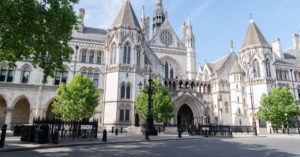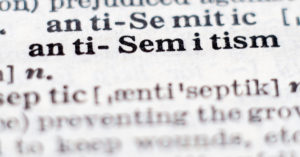Massoud Shadjareh, chairman of the Islamic Human Rights Commission, says Muslims should be focussing on the case of Nazim Ali because it exposes the threats to freedom of speech by an Israel lobby which is targeting regulated professionals.
Nazim Ali is a politically-active pharmacist in London who has been hounded by the pro-Israel lobby for almost four years. The accusations of antisemitism against him are false and must be challenged.
Ali, a passionate and outspoken pharmacist and anti-racist activist, has found himself dragged into a politically-charged row with no less important implications for free speech in general and the campaign for justice for Palestine in particular. His case is of particular significance to all regulated professionals (lawyers, doctors, accountants, nurses etc), especially those who may support the Palestinian cause.
Ali is being hounded for anti-Israel/anti-Zionist remarks he made during a pro-Palestine demonstration in London in 2017 (for a detailed timeline of his case see here). His professional body which regulates all pharmacists in Great Britain, the General Pharmaceutical Council (GPhC), initiated disciplinary proceedings in 2017 after a complaint by the Campaign Against Anti-Semitism (CAA) alleged that his comments were antisemitic as they insulted Zionists, Zionist Rabbis and those associated with the Jewish Board of Deputies at the annual Al-Quds day rally in London.
The CAA’s primary purpose is to defend the state of Israel by stigmatising as antisemitic anyone who supports Palestine and opposes Zionism.
Initially the CAA tried to persuade the Director of Public Prosecutions (DPP) to prosecute Ali. Having failed, it then brought a private prosecution against him. However, the DPP took over the private prosecution and dismissed that as well after Ali successfully argued that it was an abuse of process. Regardless the CAA carried on its witch-hunt, asking the High Court to overturn the DPP’s decision. Again, its efforts were in vain.

Concurrently with legal proceedings the CAA also prevailed upon the GPhC to open misconduct proceedings. Initially, a GPhC caseworker reviewed the complaint and held that Mr Ali’s comments were not racist, and in December 2018 lawyers acting for Mr Ali were duly informed that the case was closed.
Subscribe to our newsletter and stay updated on the latest news and updates from around the Muslim world!
However, in the summer of 2019, the GPhC reopened the case justifying its decision on the basis that it had to evaluate Ali’s comments on the basis of the International Holocaust Remembrance Alliance (IHRA) definition of antisemitism. Like many organisations, the GPhC has never adopted the problematic, highly politicised definition.
Late last year those proceedings culminated in the GPhC finding the comments made by Mr Ali to be offensive but not antisemitic. They recognised from the context and Mr Ali’s explanation, that his words were meant to be anti-Zionist political rhetoric and not antisemitic hate speech. It issued him with a warning on the grounds that his words were offensive and his behaviour amounted to misconduct.
It is interesting to note that the complainants ignore the fact that Ali repeatedly distinguished between Zionism and Jewish people and repeatedly emphasised that this was an anti-racist rally. His words were political grandstanding, a feature of any good demonstration. His delivery on occasion was careless. Ali conceded his words were offensive before the tribunal and apologised for them.
The High Court had recognised his words as being anti-Zionist (i.e. anti-Israel) given their context and the tribunal accepted his explanation for his words and believed him to be sincere in his apology.
Another High Court case
But even his explanation, apology and the sanction against him has not proved to be the end of the matter. Pro-Israel organisations turned to the GPhC’s regulator, the Professional Standards Authority (PSA), asking it to refer the matter to the High Court.
The PSA is now seeking a determination on whether the GPhC Fitness to Practice Committee had erred by taking into account the context of the speech (the pro-Palestine event) or the Ali’s intention behind the words. Instead, they argue that when looked at on their own, without context and intention, his words are in fact antisemitic as they rely upon well-worn antisemitic tropes.
The GPhC, for its part, has decided to abandon the decision made by its Fitness to Practice Committee, showing a reckless disregard for its members and undermining the integrity of its disciplinary processes (why should any regulated professional trust their regulator’s fitness to practice process if the regulator can decide to ignore the outcome of its own disciplinary processes based on a whim?).

You should note the inconsistency in the PSA and GPhC’s argument here – to argue that someone is deploying or playing to antisemitic “tropes” requires an analysis of the individual’s intentions behind their words and to conclude that he was doing so deliberately and knowingly. They simultaneously argue that the individual’s explanation of their intention formed no part of determining whether the words were antisemitic or not.
Essentially: they can attribute intention to him to find him guilty but would not take his intention into account to exonerate himself.
Pro-Israel campaigners are now using the regulatory system to attack political opponents. The regulatory process allows them to make a simple complaint and sit back and watch the immense powers of regulators brought to bear on a single registrant.
The registrant will be forced to go through the stress of a disciplinary procedure, spending vast sums of money to defend his or her reputation and livelihood. And should the complaint fail, they can make multiple appeals, each stage causing the registrant further stress and expense. Groups are even investing resources to be able to expand their capacity to target critics of Israel.
IHRA definition of antisemitism
The IHRA definition has already been used extensively to prohibit criticism of Israel and Zionism at universities by students and academics. Bristol University’s Prof. David Miller is the latest scholar to find himself in the firing line after calling for an end to Zionism on the grounds that it is a “racist, violent and imperial ideology premised on ethnic cleansing.”
Zionist groups have raised complaints with the EU about the work of IHRC, their campaign led to the shut down of an anti-racist event. They have even complained to an employer about pro-Palestine poetry read at an online event. The marriage of the IHRA definition with the regulatory framework has allowed pro-Israel groups to expand their targets from high profile figures like Jeremy Corbyn, and academics like Miller, to ordinary members of the public who wish to show support for the Palestinians.
The treatment of Ali is consistent with the use of the IHRA definition by pro-Israel organisations as a weapon with which to smear and frustrate political opponents. Indeed, if he is found guilty of antisemitism, Ali faces being struck off by the GPhC as a racist according to a highly politicised definition which seeks to protect Zionism and Israel by conflating opposition to both with antisemitism.
If a professional manages to prove he is not antisemitic, as Ali has done twice, he still faces endless court cases and appeals, countless media articles smearing his reputation, and attacks against any organisation that supports or works with him. The tactic with these complaints seems to be: get the professional barred, if that fails bankrupt him through endless litigation and destroy his reputation in the media so he becomes unemployable.

Either way, the professional must pay a devastating price for his temerity to criticise Israel.
Regulators should not allow their disciplinary processes to be used to pursue oppressive and unjustified complaints. Instead, what we are seeing in Ali’s case is the PSA and GPhC allowing their regulatory processes to be hijacked by pro-Israel activists to target, smear and destroy those who have the courage to publicly criticise Israel or Zionism.
If the PSA is successful with its appeal, it will set an alarming precedent and one that is likely to become a chilling benchmark for other regulated professional bodies. It will effectively mean that should a professional say anything that others find offensive, especially if it contravenes the IHRA definition, they will not be able to defend themselves by presenting their intention or context as a defence, thereby depriving them of a valid and vital defence for their words.
After all, the starting point of understanding the meaning of words spoken or written is the context and intention behind those words.
Needless to say, the curtailment of people’s political freedoms is a clear encroachment of civil liberties and an affront to justice. The quality of protest and pro-Palestinian speech is not the pertaining issue. We can all wish everything was expressed better according to our tastes and sensibilities. However, there will never be a situation where that is the case, and that is why paradigmatic shifts that seek to remove context from procedural matters in legal and regulatory settings is a direct threat to justice and anti-racist movements per se.
Moreover, any attempt anywhere to use the genuine scourge of antisemitism to advance the malevolent political ideology of Zionism devalues and detracts from the fight against real antisemitism. The PSA’s plan to label anti-Zionist speech as antisemitic, without taking account of context or intention, should concern us all.
UPDATE: Nazim Ali will once again face a disciplinary committee after the High Court quashed a verdict which cleared him of antisemitism charges. This week the High Court ruled that a General Pharmaceutical Council (GPC) panel “had erred” in ruling last year that the accusation that Nazim Ali had made antisemitic comments was “not proven.”


















